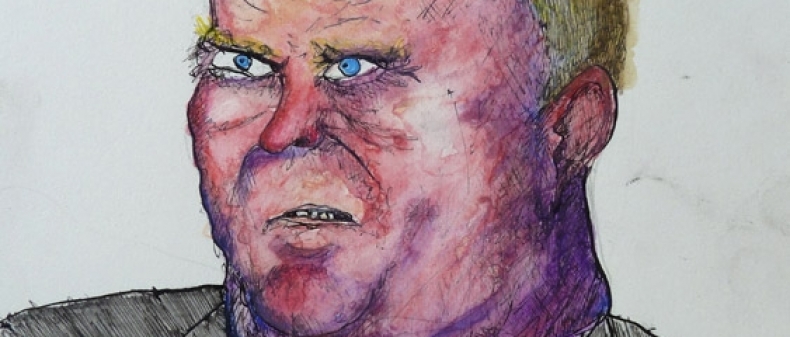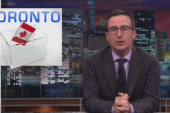
Long before allegations of Mayor Rob Ford’s crack-addled film debut hit the street, Toronto writers were letting loose in crime fiction. Since 2010, one mayor or another has shown up in fictional murder mysteries at least five times. Three novels, a play, and a 42-part video series have ranged from directly invoking a futuristic Rob Ford to claiming inspiration from David Miller. Sometimes, the mayor’s a victim, and sometimes he’s a suspect, but whatever the story, the character’s never quite mayoral.
Thing is, nothing that’s shown up in fiction comes anywhere close to the mayhem splashed across Toronto headlines these past couple weeks.
Robert Rotenberg, whose Strangle Hold is fourth in his series of Ari Greene mysteries, is a criminal defence lawyer by day. As an author, he says he writes about “the city right now,” adding, “Fiction has an advantage over non-fiction. We’re able to write the truth.”
Observing from New York City, Sarah Weinman, who covers crime fiction for National Post, tweeted: “Am I going to be reviewing a crime novel in my column 18 months from now not-so-loosely based on the Rob Ford craziness?” If she does, it’s going to be somewhat darker than what’s been written to date.
Take Jill Edmondson’s The Lies Have It. Crack it open just about anywhere and sass drips off the page. In 2010, she had the story ready to go. A dead body pops up after a fetish party above Toronto’s Pilot Tavern. Great premise, but it lacked legs. She needed more fodder. Fodder she found during the city’s election campaign. Since her books are like a walking tour of Toronto, it was natural to pepper the landscape with references to a candidate promising to tunnel a fresh highway to downtown or a “three-hundred-pound, donut-snarfing, sub-literate, right-wing troglodyte–the only candidate whose victory would make me want to self-immolate in front of a library.”
That last bit lit up the Twittersphere, with rafts of people complaining that Edmondson was targeting Mayor Rob Ford’s weight problem. In fact, it was his brother Doug’s comments that had stuck in her craw. Especially the one about living in a neighbourhood with more Tim Hortons than libraries. When Doug Ford famously claimed he wouldn’t recognize Margaret Atwood if he passed her in the street, a groundswell of support for libraries and librarians made it difficult for the brothers Ford to sop up that bit of the city’s gravy. Politicians ought to know better than to take cheap shots at writers, it seems.
Rotenberg’s Strangle Hold also plays out against an election campaign. It features another rotund mayoral candidate, Hap Charlton. This one is a former police chief and part-time rugby coach.
Look at the mayors of Calgary or Toronto, says Rotenberg. “Like ’em or hate ’em, they’re dynamic, colorful, interesting characters.” Since mayors are not tied to party politics, it’s possible for larger-than-life personalities to take office. Take Mel Lastman, for example. Twice elected mayor after Toronto’s amalgamation, Rotenberg wonders whether anyone could really see him as premier, let alone prime minister.
But the more cynical voters become, and the lower the regard in which they hold politicians in general, can we really expect the best and brightest to run for public office anymore? We’ve got a 24/7 news cycle that leaves nowhere to hide and a social media hornets’ nest that rips reputations to shreds before facts are fully aired. It takes a special breed to want in on today’s political game.
A breed that makes great fodder for crime fiction writers.
Even a guy like former Toronto Mayor David Miller wasn’t safe from attack. Whatever one thought of his policies, the man always projected an aw-shucks aura of friendliness. Yet he inspired crime fiction that went right for the jugular.
The first book in Robin Spano’s Clare Vengel series (Dead Politician Society) started out as political satire then turned into crime fiction as she wrote it. She was looking for a scapegoat after watching every level of government take what she viewed as ill-advised swipes at Toronto’s entertainment entrepreneurs. Her husband ran a mid-town bar that was slammed by a municipal smoking bylaw (which exempted casinos), followed by tax hikes coupled with new charges for city services like garbage collection. Thinking on their feet, they started to host poker tournaments at the bar, and soon had revenues back where they needed them. People lined up outside the door. Then the CRA tightened the rules and undercover cops began stalking the joint. The poker had to stop.
Spano took her frustrations out on the page. She opened her debut novel with a dead Toronto mayor. After that, her story had politicians falling like dominoes. Angry much? “I immediately started to feel better,” says Spano. “Somehow writing was enough of a vindication.” While the characters were all fictitious, the policies she skewered were real. And the book’s publication led to her winning a Twitter contest as the person who most deserved to meet then-Mayor David Miller.
“I love murder mysteries,” said Miller when they met, “but I’ve never been bumped off before.” When Spano promised not to kill him in real life, he thanked her and said, “That’s good, ’cause I’m leaving, so I don’t need to be killed.”
Approached for comment on this article, Miller declined in light of current events. Mayor Ford could not be reached.
Rotenberg said that fiction writers are able to write the truth. The question is, what is the truth? Is the truth that Canadians are so fed up with our political class that we assume they are criminal? Have we seen enough bad behavior–some proven, some alleged–that we fantasize the worst kind of retribution? Does the absence of meaningful proportionate consequences for serious lapses in politicians’ judgment make us angry? Or just numb.
With voter turnout languishing and public ire flaming out faster than last week’s headlines, is fiction the last refuge of enduring political comment? And what happens when the real news overshadows even the wackiest ideas crime fiction writers can dream up?
There was a time when a mayoral murder mystery set in Toronto the Good would have struggled with a credibility gap. Not so any more, says Edmondson. “If I had tried to pitch anything resembling Rob Ford’s mayoral trajectory, a publisher would have rejected the character as unbelievable.” It’s worth noting she made that reflection before the current news stories erupted.
Novelists haven’t been the only Toronto writers to draw inspiration from mayoral politics. John Greyson, a filmmaker and York University professor, wrote and directed Murder in Passing, a 42-episode whodunit that aired on Toronto Transit Commission subway platforms from January to March, 2013. In it, the mayor is one of the suspects in the murder of a bicycle courier, and is described as having defunded “the pinky parade” along with “bike lanes and libraries and arts funding.” It’s all fictitious, though. And Greyson, whose work frequently deals with gay themes, reminded Toronto Standard that the story is based in Passing, BC. Still, he writes from Toronto. And it’s about bikes. And a mayor who hates them.
Matt Jones’ 2011 play, Rob Ford and the Mysterious Case of the Flying Anarchist, was a little less circumspect in referencing its inspiration. Set in 2018, it used the future as a veil. Even that piece–a Fringe Festival play reported to have been slapstick in the extreme–failed to rival the story lines in the mainstream press over the past couple of weeks.
There’s nothing new about satirists taking strips off politicians. And this spate of darker fiction involving political misbehaviour that leads to murder may reflect a level of public disgust left unsatisfied at the ballot box. No question: Toronto’s political scene is a source of frustration and black humour for many residents. But that can be said about politics in any big city, in any era. So what’s changing?
“In Canada,” says Rotenberg, “municipal politics is becoming very important. Canada has gone from rural to urban. Cities–not just Toronto–are where modern problems exist: transportation, drugs, guns.” It’s only natural that crime fiction reflects that shift.
Still, it’s worth wondering. With current events in mind, how extreme will crime fiction have to become before it rivals hard news–or what currently passes for it–in terms of audience titillation? The answer may be coming soon–to an airport paperback stand near you.
____
Rob Brunet is a Toronto-based crime fiction author. Follow him on Twitter at @RRBrunet.
For more, follow us on Twitter at @TorontoStandard and subscribe to our newsletter.














